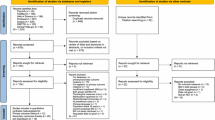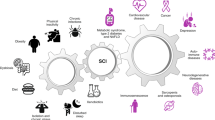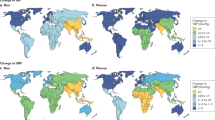Abstract
Background/objectives:
Mediterranean diet and perceived stress have long been associated with the likelihood of having an acute coronary syndrome (ACS). The aim of this study was to evaluate whether the Mediterranean diet and other eating behaviors mediate and/or moderate the unfavorable impact of perceived stress on the likelihood of having a non-fatal ACS.
Subjects/methods:
This is a case–control study with individuals matched by age and sex. A total of 250 consecutive patients (60±11 years, 78% men) with a first ACS and 250 population-based, control subjects (60±8.6 years, 77.6% men) were enrolled. Perceived stress levels were evaluated with the Perceived Stress Scale (PSS-14; range 0–14), and adherence to the Mediterranean diet was assessed by the MedDietScore (range 0–55). Stress eating, eating heavy meals and eating alone were also evaluated.
Results:
For each unit increase in the PSS-14, the likelihood of having an ACS increased by 14% (95% confidence interval (CI)=1.10, 1.18). Stratified analysis by Mediterranean diet adherence level revealed a similar association of PSS-14 with ACS likelihood between the low-to-moderate and moderate-to-high adherence groups (that is, odds ratio (OR)=1.15, 95% CI=1.09, 1.21 and OR=1.13, 95% CI=1.07, 1.80, respectively). Stress eating and eating alone were positively associated with the likelihood of having an ACS (OR=1.31, 95% CI=0.97, 1.77 and OR=1.36, 95% CI=1.08, 1.69, respectively). Eating heavy meals was not associated with ACS (OR=1.08, 95% CI=0.82, 1.41); no mediating or moderating effect of these behaviors on perceived stress ACS was observed.
Conclusions:
The highly significant impact of perceived stress on ACS likelihood was not mediated or moderated by the level of adherence to the Mediterranean diet or other eating behaviors, underlying the strong effect of this psychological disorder on ACS.
This is a preview of subscription content, access via your institution
Access options
Subscribe to this journal
Receive 12 print issues and online access
$259.00 per year
only $21.58 per issue
Buy this article
- Purchase on Springer Link
- Instant access to full article PDF
Prices may be subject to local taxes which are calculated during checkout
Similar content being viewed by others
References
Cohen S, Janicki-Deverts D, Miller GE . Psychological stress and disease. JAMA 2007; 298: 1685–1687.
Ohlin B, Nilsson PM, Nilsson JA, Berglund G . Chronic psychosocial stress predicts long-term cardiovascular morbidity and mortality in middle-aged men. Eur Heart J 2004; 25: 867–873.
Von Känel R . Psychosocial stress and cardiovascular risk: current opinion. Swiss Med Wkly 2012; 142: w13502.
Chandola T, Britton A, Brunner E, Hemingway H, Malik M, Kumari M et al. Work stress and coronary heart disease: what are the mechanisms? Eur Heart J 2008; 29: 640–648.
Eaker ED, Sullivan LM, Kelly-Hayes M, D'Agostino RB Sr, Benjamin EJ . Marital status, marital strain, and risk of coronary heart disease or total mortality: the Framingham Offspring Study. Psychosom Med 2007; 69: 509–513.
Cohen S, Kamarck T, Mermelstein R . A global measure of perceived stress. J Health Soc Behav 1983; 24: 385–396.
Katsarou AL, Triposkiadis F, Panagiotakos D . Perceived stress and vascular disease: where are we now? Angiology 2012; 64: 529–534.
Richardson S, Shaffer JA, Falzon L, Krupka D, Davidson KW, Edmondson D . Meta-analysis of perceived stress and its association with incident coronary heart disease. Am J Cardiol 2012; 110: 1711–1716.
Chrousos GP . The role of stress and the hypothalamic–pituitary–adrenal axis in the pathogenesis of the metabolic syndrome: neuroendocrine and target tissue-related causes. Int J Obes Relat Metab Disord 2000; 24: 50–55.
Anagnostis P, Athyros VG, Tziomalos K, Karagiannis A, Mikhailidis DP . Clinical review: the pathogenetic role of cortisol in the metabolic syndrome: a hypothesis. J Clin Endocrinol Metab 2009; 94: 2692–2701.
Steptoe A, Brydon L . Emotional triggering of cardiac events. Neurosci Biobehav Rev 2009; 33: 63–70.
Harrington J, Perry IJ, Lutomski J, Fitzgerald AP, Shiely F, McGee H et al. Living longer and feeling better: healthy lifestyle, self-rated health, obesity and depression in Ireland. Eur J Public Health 2010; 20: 91–95.
Hu FB, Willett WC . Optimal diets for prevention of coronary heart disease. JAMA 2002; 288: 2569–2578.
Sofi F, Cesari F, Abbate R, Gensini GF, Casini A . Adherence to Mediterranean diet and health status: meta-analysis. BMJ 2008; 337: a1344.
Kastorini CM, Milionis HJ, Esposito K, Giugliano D, Goudevenos JA, Panagiotakos DB . The effect of Mediterranean diet on metabolic syndrome and its components: a meta-analysis of 50 studies and 534 906 individuals. J Am Coll Cardiol 2011; 57: 1299–1313.
Medina FX . Mediterranean diet, culture and heritage: challenges for a new conception. Public Health Nutr 2009; 12: 1618–1620.
Panagiotakos DB, Pitsavos C, Chrysohoou C, Stefanadis Ch, Toutouzas P . The role of traditional Mediterranean-type of diet and lifestyle, in the development of acute coronary syndromes: preliminary results from CARDIO2000 study. Cent Eur J Public Health 2002; 10: 11–15.
Kuriyama S . Green tea consumption and prevention of coronary artery disease. Circ J 2010; 74: 248–249.
Grossniklaus DA, Dunbar SB, Tohill BC, Gary R, Higgins MK, Frediani J . Psychological factors are important correlates of dietary pattern in overweight adults. J Cardiovasc Nurs 2010; 25: 450–460.
Groesz LM, McCoy S, Carl J, Saslow L, Stewart J, Adler N et al. What is eating you? Stress and the drive to eat. Appetite 2012; 8: 717–721.
Rod NH, Grønbaek M, Schnohr P, Prescott E, Kristensen TS . Perceived stress as a risk factor for changes in health behaviour and cardiac risk profile: a longitudinal study. J Intern Med 2009; 266: 467–475.
Laugero KD, Falcon LM, Tucker KL . Relationship between perceived stress and dietary and activity patterns in older adults participating in the Boston Puerto Rican Health Study. Appetite 2011; 56: 194–204.
Ford PA, Jaceldo-Siegl K, Lee JW, Youngberg W, Tonstad S . Intake of Mediterranean foods associated with positive affect and low negative affect. J Psychosom Res 2013; 74: 142–148.
Antonogeorgos G, Panagiotakos DB, Pitsavos C, Papageorgiou C, Chrysohoou C, Papadimitriou GN et al. Understanding the role of depression and anxiety on cardiovascular disease risk, using structural equation modeling; the mediating effect of the Mediterranean diet and physical activity: the ATTICA study. Ann Epidemiol 2012; 22: 630–637.
Matsumura K, Yamakoshi T, Noguchi H, Rolfe P, Matsuoka Y . Fish consumption and cardiovascular response during mental stress. BMC Res Notes 2012; 5: 288.
Sauder KA, Johnston ER, Skulas-Ray AC, Campbell TS, West SG . Effect of meal content on heart rate variability and cardiovascular reactivity to mental stress. Psychophysiology 2012; 49: 470–477.
Kastorini CM, Milionis HJ, Goudevenos JA, Panagiotakos DB . Modeling the role of dietary habits and eating behaviors on the development of acute coronary syndrome or stroke: aims, design, and validation properties of a case-control study. Cardiol Res Pract 2011; 201: 313948.
Thygesen K, Alpert JS, White HD . Universal definition of myocardial infarction. J Am Coll Cardiol 2007; 50: 2173–2195.
Craig CL, Marshall AL, Sjostrom M, Bauman AE, Booth ML, Ainsworth BE et al. International physical activity questionnaire: 12-country reliability and validity. Med Sci Sports Exerc 2003; 35: 1381–1395.
Papathanasiou G, Georgoudis G, Papandreou M, Spyropoulos P, Georgakopoulos D, Kalfakakou V et al. Reliability measures of the short International Physical Activity Questionnaire (IPAQ) in Greek young adults. Hellenic J Cardiol 2009; 50: 283–294.
Katsarou A, Panagiotakos D, Zafeiropoulou A, Vryonis M, Skoularigis I, Tryposkiadis F et al. Validation of a Greek version of PSS-14; a global measure of perceived stress. Cent Eur J Public Health 2012; 20: 104–109.
Andreou E, Alexopoulos E, Lionis C, Varvogli L, Gnardellis C, Chrousos GP et al. Perceived Stress Scale: reliability and validity study in Greece. Int J Environ Res Public Health 2011; 8: 3287–3298.
Bountziouka V, Bathrellou E, Giotopoulou A, Katsagoni C, Bonou M, Vallianou N et al. Development, repeatability and validity regarding energy and macronutrient intake of a semi-quantitative food frequency questionnaire: Methodological considerations. Nutr Metab Cardiovasc Dis 2012; 22: 659–667.
Panagiotakos DB, Pitsavos C, Stefanadis C . Dietary patterns: a Mediterranean diet score and its relation to clinical and biological markers of cardiovascular disease risk. Nutr Metab Cardiovasc Dis 2006; 16: 559–568.
Baron RM, Kenny DA . The moderator–mediator variable distinction in social psychological research: conceptual, strategic, and statistical considerations. J Personality Soc Psychology 1986; 51: 1173–1182.
Rumsfeld JS, Ho PM . Depression and cardiovascular disease: a call for recognition. Circulation 2005; 111: 250–253.
Kastorini CM, Milionis HJ, Georgousopoulou E, Kostapanos MS, Yannakoulia M, Nikolaou V et al. Modelling eating practices in non-fatal acute coronary syndrome or stroke development: a case/case-control study. Nutr Metab Cardiovasc Dis 2013; 23: 242–249.
Daubenmier J, Kristeller J, Hecht FM, Maninger N, Kuwata M, Jhaveri K et al. Mindfulness intervention for stress eating to reduce cortisol and abdominal fat among overweight and obese women: an exploratory randomized controlled study. J Obes 2011; 2011: 651936.
Epel E, Jimenez S, Brownell K, Stroud L, Stoney C, Niaura R . Are stress eaters at risk for the metabolic syndrome? Ann NY Acad Sci 2004; 1032: 208–210.
O’Connor DB, O’Connor RC . Perceived changes in food intake in response to stress: the role of conscientiousness. Stress Health 2004; 20: 279–291.
Rosmond R, Dallman MF, Bj¨orntorp P . Stress-related cortisol secretion in men: relationships with abdominal obesity and endocrine, metabolic and hemodynamic abnormalities. J Clin Endocrinol Metab 1998; 83: 1853–1859.
Lands WE . Primary prevention in cardiovascular disease: moving out of the shadows of the truth about death. Nutr Metab Cardiovasc Dis 2003; 13: 154–164.
Sergey CM, Rapoport SI, Agarval RK, Singh RB, De Meester F, Wilkzynska A et al. Potential chonobiological triggering factors of acute heart attack. Open Nutraceuticals J 2010; 3: 166–173.
Lohse B, Psota T, Estruch R, Zazpe I, Sorli JV, Salas-Salvadó J et al PREDIMED Study Investigators Eating competence of elderly Spanish adults is associated with a healthy diet and a favorable cardiovascular disease risk profile. J Nutr 2010; 140: 1322–1327.
Acknowledgements
We thank the field investigators of the study: Julia DeVita, Georgio Karayanni, Emmanuela Griva, Asimenia Kouroupi, Evaggelia Nanou, Konstantino Syriano, Dionysia Voutsa, and Nikolao Zaxaro.
Author information
Authors and Affiliations
Corresponding author
Ethics declarations
Competing interests
The authors declare no conflict of interest.
Rights and permissions
About this article
Cite this article
Katsarou, A., Triposkiadis, F., Skoularigis, J. et al. Evaluating the role of Mediterranean diet and eating behaviors on the likelihood of having a non-fatal acute coronary syndrome, under the context of stress perception: a case–control study. Eur J Clin Nutr 68, 1016–1021 (2014). https://doi.org/10.1038/ejcn.2014.74
Received:
Revised:
Accepted:
Published:
Issue Date:
DOI: https://doi.org/10.1038/ejcn.2014.74



